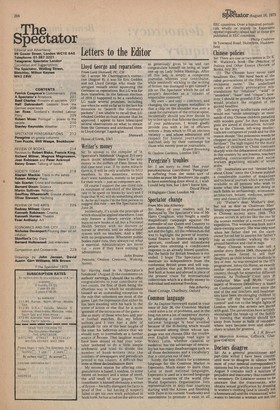Common language
Sir: As Daphne Hereward stated in your issue of July 26, the ComMon Market could solve a lot of problem, and in the long run save a lot of taxpaYers' money by adopting a common language. A national language is best avoided because of the ill-feeling which would be aroused among those whose language was not chosen (like the trouble over English language road signs in Wales). Latin, whether classical or medieval, has the advantage of neutrality but has many disadvantages such as all those declensions and a vocabulary that is centuries out of date.
Surely, the best choice for a common language for the Common Market is Esperanto. Much easier to learn than Latin or most national languages, Esperanto is used as a second language in most countries of the world (the World Esperanto Organisation lists representatives in sixty-four countries starting withl the Azores and finishing with Zaire in Iits current Yearbook) and associations lo promote it exist in all
Spectator August 16, 1975 EEC countries. Over a hundred periodicals wholly or mainly in Esperanto appear regularly; about half of these are published in EEC countries.
34 Townend Road, HolmPfihrtilhi 34 Townend Road, HolmPfihrtilhi
field
Chinese policies p, ur Crabtree terrese Sir There are one or two errors in Dr K. W. Watkins's book The Practice of Politics and Other Essays (Review of Books. July 26).
(1) The Chinese have never used headlines like, "Hit hard back at the rabid provocations of the filthy Soviet revisionist swine." The underlined words are clearly provocative mistranslations for "retaliate", "wild" or "senseless", "base" and "clique"; however, I should be grateful if Dr Watkins would produce the original of the quoted headline.
(2) Left-wing intellectuals certainly would not "smile admiringly at thousands of tiny Chinese children parading with wooden guns" for they know the guns are aimed at themselves. According to the Chinese, left-wing intellectuals are corrupters of youth and for this reason should "like poisonous weeds be chopped up and hoed into the ground as fertiliser". The high regard for the moral welfare of children in China contrasts sharply with the debasement of children in this country by sex lessons, teachers peddling contraceptives and social workers organising squads of street arabs.
(3) Journalists are not "denied facts about China" since the Chinese publish a considerable number of magazines and technical journals which are readily available to all persons who wish to know what the Chinese are doing in such fields as archaeology, economics, architecture, botany, medicine, astronomy and classical literature. (4) "Father's dear, Mother's dear, but not as dear as Chairman Mao" Simply expressed the profound changes in Chinese society since 1949. This phrase occurs in articles like the one bY the woman member of a recent Everest expedition. This woman was born into a slave-owning society. She was only nine when her father died yet the slaveowner forced her to assume her father's role as cattle-tender, walking the icy ground barefoot and clad in rags.
Many Chinese women can tell a similar story. Before 1949, thousands of parents Were forced to sell their daughters as child brides to landlords in lieu of rent. As was revealed in the ITV programme, Johny Go Home, an exactly similar situation now exists in this country, though for somewhat different reasons. As Professde Creel says ii Confucius, Man anaMyth, "e-VerV aspect of Western .Deincicracy is based on Confucianism", and ever since the end of the war teachers and headmasters have been encouraging children to "throw off the fetters of parental control" and run to the bright lights of London where the streets are paved with gold. The universities have actiVely encouraged the break-up of the family by insisting that students should live away from home in halls of residence where boys become men and debauchery is taken for granted.
A. J. H. Brow n 46 Meton Avenue, Giffnock, Glasgow G46 6DX ny
34 Townend Road, HolmPfihrtilhi
field
Chinese policies p, ur Crabtree terrese Sir There are one or two errors in Dr K. W. Watkins's book The Practice of Politics and Other Essays (Review of Books. July 26).


































 Previous page
Previous page